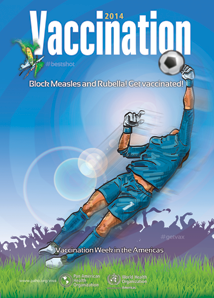World Cup travellers urged to get measles shots
 (CNS): Cayman Islands residents who are planning to travel to Brazil next month for the World Cup are being urged by the Public Health Department to get the necessary vaccinations against measles and rubella if they are not already protected. The international football tournament begins on 12 June and lasts for a month until the final on 13 July, and concerns regarding the possible re-emergence in the region of the disease and a recent outbreak in Canada has led to heightened concerns in Cayman, which has been measles free for some 23 years, aboutits possible return through travel.
(CNS): Cayman Islands residents who are planning to travel to Brazil next month for the World Cup are being urged by the Public Health Department to get the necessary vaccinations against measles and rubella if they are not already protected. The international football tournament begins on 12 June and lasts for a month until the final on 13 July, and concerns regarding the possible re-emergence in the region of the disease and a recent outbreak in Canada has led to heightened concerns in Cayman, which has been measles free for some 23 years, aboutits possible return through travel.
“The Pan American Health Organization (PAHO) and the World Health Organization (WHO ) recommend that all residents of the Americas travelling to the 2014 FIFA World Cup are fully vaccinated against measles and rubella, to maintain the elimination of both diseases in the region,” Cayman’s Medical Officer of Health, Dr Kiran Kumar said. “All vaccinations must be completed at least two weeks before travel.”
There have been no reported casesof measles in the Cayman Islands since 1991 and immunization coverage here is over 90% among infants and over 95% for most of the diseases among four year olds at the time of school entry.
At the same time measles remains common in many developing countries, particularly in Africa and Asia, and people visiting these regions should pay attention to possible symptoms. In March 2014, an outbreak was also reported in Canada within an unvaccinated population. The easy access and frequency of air travel puts all non-immune persons at risk for infectious diseases such as measles until they are eliminated globally.
Accordingly all travellers to the World Cup over the age of 6 months are to be vaccinated against measles and rubella, preferably with the MMR (measles, mumps, rubella) vaccine. In the Cayman Islands, two doses of MMR are customarily given at 15months and again at 4-6 years. Travellers who are not up to date with their vaccines are at greater risk of contracting these diseases when in close contact with infected persons in countries and locations where the viruses still circulate.
“Anyone returning from these regions who experiences a sudden high fever accompanied by a rash, is encouraged to seek medical attention immediately and to give a travel history to facilitate investigation,” said Dr Kumar.
“The first sign of measles is usually a high fever which begins about 10 to 12 days after exposure to the virus. A runny nose, cough along with red and watery eyes and small white spots inside the cheeks can develop in the initial stage followed by a rash on the face and upper neck, eventually reaching the hands and feet,” he explained.
Measles is caused by a virus which grows in the cells that line the back of the throat and lungs. Measles is a human disease and is not known to occur in animals.
Travellers to Brazil are advised to contact the Public Health Clinic on 244-2648 or Faith Hospital on 948-2243 for an appointment, or to consult their physician to seek necessary vaccination and travel advisory.
Category: Health


So based on that picture, if I do not get my vaccinations my head will fall off?
Can I get a vaccination from the death itself? See,I was born and that means I will die someday from something.